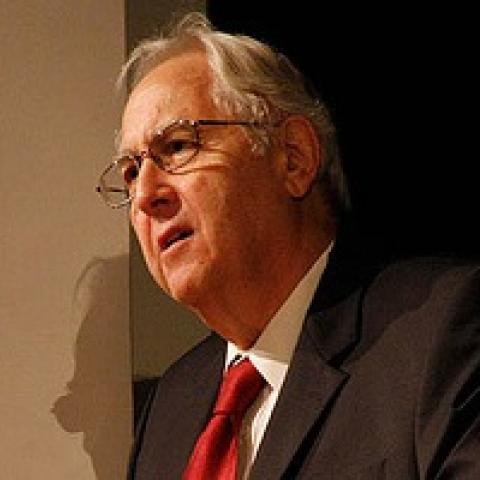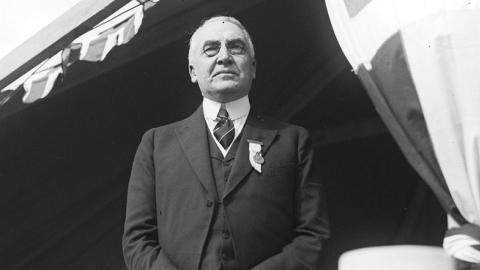There is a good chance the GOP will hold a contested convention in July. If that happens and no candidate obtains the necessary 1,237 votes on the first ballot, the delegates will be released and will be free to vote as they please on subsequent ones. As the balloting continues, if neither Ted Cruz nor Donald Trump is able to reach the magic number, a deadlock could result prompting the delegates to turn to John Kasich, or to draft someone else.
Scott Sipprelle has made the case in Observer for Mr. Kasich to win along these lines, pointing out that contested conventions have happened before, with the eventual victory going to a candidate other than the frontrunner. He gives as his example the nomination of Abraham Lincoln in 1860, whom he writes was “a long-shot Republican presidential contender,” but who won on the third ballot.
An even better example, analogous to the situation facing the GOP today, was the contested Republican Convention of 1920, which nominated Ohio Senator Warren G. Harding on the tenth ballot. Ten Republicans were seeking the prize. Leading the pack were two prominent figures: General Leonard Wood and Frank O. Lowden of Illinois. Mr. Wood rode with Teddy Roosevelt’s Rough Riders in Cuba and had been Governor General of the Philippines and Military Governor of Cuba. He also was a physician who took care of both President Grover Cleveland and President William McKinley. Mr. Lowden had been Governor of Illinois, and was considered by many to be the strongest candidate. The two were evenly matched going into the convention.
Among those running were prominent men including mining engineer and head of European war relief during the Wilson administration, Herbert Hoover; the president of Columbia University, Nicholas Murray Butler; Gov. Calvin Coolidge of Massachusetts, and Senator Miles Poindexter of Washington. Teddy Roosevelt, who had been expected to be the Party’s nominee, suddenly died in January of 1919, prompting aspiring candidates to claim his mantle. General Wood was one of them but so was the progressive Senator from California, Hiram Johnson, who claimed he was the only candidate who would carry on T.R.’s fight. Observers considered Mr. Johnson a more than likely victor if the frontrunners were deadlocked. Mr. Johnson, however, was far on the left of the political spectrum, and many Republicans attacked him as virtually a Red.
When Warren Harding declared his candidacy on December 19, 1919, few paid attention, considering Mr. Harding to be more than a long shot. But Mr. Harding had an advantage. Then, as now, Ohio was considered the one state which the presidential candidate had to win if he was to become president. By 1920, Ohio, already nicknamed the “mother of presidents,” had given the nation seven presidents, most recently William McKinley and William Howard Taft.
In his campaign for the nomination, Mr. Harding made it his policy not to go after votes in those primary states from which a “favorite son” was running. When his Western regional campaign manager suggested he aggressively take on Senator Miles Poindexter of Washington, Mr. Harding answered that he did not want to antagonize him, and noted how angry he would be if Mr. Poindexter campaigned in Ohio and tried to weaken him there. He shrewdly pointed out that if he did this, he could act to secure “their support at such a time as they become convinced that he cannot be made the nominee of the Convention.”
But much to Mr. Harding’s consternation, General Wood did not return the sentiment and campaigned heavily in Ohio. Mr. Harding ended up with 39 delegates to Mr. Wood’s nine. Mr. Harding became discouraged when he did not do well in Indiana and Montana, where he had expected to get support. His path to the presidency was clearly not going to be by way of the primaries.
How, then, did Mr. Harding get the nomination, proving all the pundits wrong? First, Mr. Harding and his campaign manager, Harry Daugherty, developed a strategy—based on making Mr. Harding everyone’s second or third choice. With that in mind, in addition to not challenging favorite son candidates in their states, Mr. Harding did not say anything bad about those running against him. Like Mr. Kasich today, he purposefully stood above the fray. Instead, Mr. Harding ran a positive and optimistic campaign focusing on how he would address the severe economic and unemployment problems the country was facing after the end of World War One.
Mr. Harding also was running at the time of a major split in the party, between the regular Republicans and the Progressives, who bolted in 1912 and supported T.R.’s Progressive or Bull Moose Party, and only recently had returned to the Republican ranks. Mr. Harding knew that in order to win, he needed the support of both factions, and would have to stand for policies that appealed to both wings. He was successful in bridging that divide.
To win the nomination, a candidate had to receive 493 delegate votes. If that number was split between Mr. Lowden and Mr. Wood, as Mr. Harding assumed it would be, he believed he could get enough delegates to support him as their second or third choice. His campaign manager, Harry Daugherty, saw to it that all the delegates and potential delegates were contacted and asked to consider supporting Mr. Harding if a deadlock occurred. He told the press that he was “getting in touch with the leaders and delegates who are for Wood and Lowden, “being friendly with them. When the convention comes,” he predicted, “these two armies will battle each other to a standstill. When both realize they can’t win…both the armies will remember me and this little headquarters…both sides will then [go] to Harding.”
Mr. Harding had a lucky break when both frontrunners were discredited as the result of new exposures relating to their campaign expenses and expenditures. A Senate subcommittee found that a millionaire businessman had given Mr. Wood’s campaign $700,000 of a total campaign chest of $1,770,000. Mr. Lowden’s entire campaign chest was close to $415,000—a relatively modest amount—but it was revealed that he sent checks of $2,500 to two delegates from Missouri in exchange for their promise to vote for him. Mr. Harding, in contrast, had a policy of not taking money from wealthy donors.
Mr. Harding’s campaign was ready when the delegates arrived in Chicago during a relentless June heat wave. Mr. Daugherty put up 500 of his best men at the Congress Hotel; the campaign staff grew to over 2,000 volunteers. He bragged that by opening day, they had the most complete poll of delegates from first to fourth choice, and the most complete political organization set up to nominate a president. He had what he called “this small army” meet every train that arrived, and shake hands with every delegate. He put loyal Harding delegates in every hotel and saw to it that his representatives were in the campaign headquarters of every rival.
Convinced the delegates had to associate Mr. Harding with good cheer and positive feelings, Mr. Daugherty turned to entertainment to win them over. He brought with him 75 members of the Columbus, Ohio Glee Club. Decked out in full evening dress, they would go from one campaign headquarters to another, where they would sing the favorite tunes of the day for the campaign staffs. They avoided direct endorsement of anyone, although everyone knew the Harding campaign had brought them and paid their expenses. It was Mr. Daugherty’s hope that when they began to vote on the Convention floor, they would feel more disposed to vote for Mr. Harding.
Rather than being controlled by strong political bosses, the Convention delegates were there, as the Convention Chairman Will H. Hays put it, “to elect, not select, the candidate.” 693 of the 984 voting delegates “were uninstructed beyond the obligation of casting a courtesy vote for a favorite son until released.” Moreover, both party factions, stung by the election of Mr. Wilson after the party had split, knew they had to have a rather uneasy truce if Republicans were going to retake the White House, as well as the House and Senate.
Once it was clear that no frontrunner had enough delegates to win on the first ballot, the candidates began to scramble with offers that would put at least either Mr. Lowden or Mr. Wood in as the nominee. Hence each camp offered their rival the vice president’s slot on the ticket. Such was the animosity between the two, that neither Mr. Lowden nor Mr. Wood agreed to run as the second man on the other’s presidential slate. As one Senator put it “such feeling had been engendered between the two camps by the time the Convention met that it was impossible for the followers of either to be reconciled to the other’s candidate.”
On the first ballot, Mr. Wood received 287 ½ delegate votes; Mr. Lowden 211½ and Mr. Harding was the lowest of all the candidates, receiving only 65 ½ . By the fourth ballot, Mr. Wood and Mr. Lowden both increased their votes, and Mr. Harding fell even further, down to 61 votes. The Convention went into recess, to gather the next day, June 19. Mr. Lowden was finally convinced he was never going to have enough votes to prevail and released his delegates to vote for whomever they wanted. Expecting them to vote for Mr. Harding, he personally went to the Ohio Senator and congratulated him on what he said would be his forthcoming nomination.
At 4:46 pm that afternoon, in a stifling heat of 100 degrees outdoors—and much hotter in the Convention hall—Henry Cabot Lodge announced that the ninth ballot would now take place. Just as both Mr. Harding and Mr. Daugherty had planned, a break came. The delegates from Connecticut, Kansas and Kentucky swung to Mr. Harding, who now received 347 ½ votes, still short of the 493 necessary to win. On the tenth ballot, helped by the 60 new votes he received from Pennsylvania’s delegation, Mr. Harding surpassed the number necessary to win with a total slightly over 692 votes. The Convention then voted to acclaim Mr. Harding’s nomination to be unanimous.
Contrary to popular myth, there was no “smoke filled room” where Republican elites anointed Mr. Harding the night before. As Indiana’s Senator James E. Watson put it, “We remembered 1912 with grief, and 1916 with pain, and we did not want a repetition of either calamity.” The inescapable fact was that, given the situation, Mr. Harding was the right choice. He came from the necessary State of Ohio, almost everyone had a positive feeling about him and he faced little strong opposition. He was the only candidate in such an advantageous position.
Progressives were more than upset. Writing in The Nation, Oswald Garrison Villard commented that “in selecting Senator Harding the party reverted to type.” Mr. Harding was, Mr. Villard wrote, “the McKinley of 1920.” And that, of course, was something Republicans were indeed happy to proclaim. The St.Louis Globe-Democrat explained to its readers that Mr. Harding was “without doubt, a man of the McKinley type, having much the same sane and balanced judgment.” He could be “depended upon to steer a straight course in the difficult waters… a man who has no fantastic notions, but who is actuated by plain common sense.”
Mr. Harding would go home to Marion, Ohio where like Mr. McKinley, he ran his campaign from his front porch—and over 600,000 well-wishers, citizen delegations and political leaders came to see him. He won the Presidency in an unprecedented landslide, getting 60.3 percent of the vote.


















